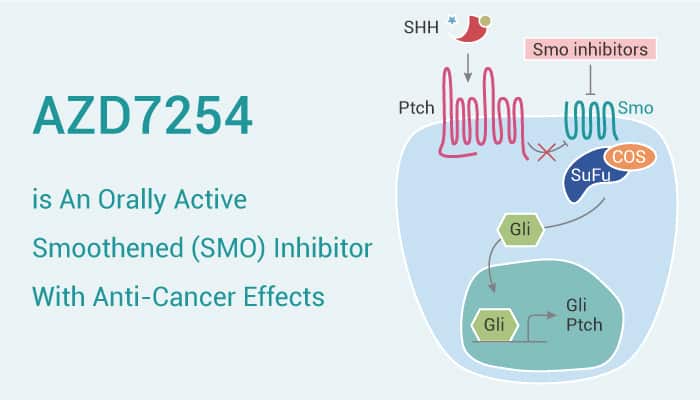Smoothened (Smo), a class Frizzled G protein-coupled receptor (class F GPCR), transduces the Hedgehog (Hh) signal across the cell membrane. Smo is a cell-cell communication system critical for embryonic development and adult tissue homeostasis. While the Hh signaling pathway includes both canonical and noncanonical pathways. The canonical Hh pathway functions through major Hh molecules such as Hh ligands, PTCH, Smo, and GLI, whereas the noncanonical Hh pathway involves the activation of Smo or GLI through other pathways. Furthermore, mutations in proteins that relay Hh signals between cells cause birth defects and cancer. The Hh signaling cascade is initiated by the binding of the Hh protein-ligand to its cellular membrane receptor, Patched (PTCH). PTCH itself is a tumor suppressor that keeps the Hh pathway off by inhibiting Smo.

AZD7254 is an orally active Smoothened (SMO) inhibitor with anti-cancer effects. In addition, AZD7254 potently inhibits sonic Hh protein (shh). Some of the key ligand-protein interactions in AZD7254: 1) the imidazole group forms edge-to-plane π-π interactions, one with the indole group of Trp281 and another with His470; and 2) the hydrogen bond between the imidazole NH and the phenol group of Tyr394. In an HT29-MEF (murine embryonic fibroblast) co-implant xenograft model, AZD7254 (p.o.; 40 mg/kg; twice daily; for 10 days) exhibits tumor growth inhibition. Moreover, AZD7254 shows moderate plasma clearance in both mouse and rat, while AZD7254 shows high clearance in both mice and rat. Lastly, AZD7254 shows inactive in Na+ or K+ ion channel assays but shows moderate hERG inhibition.
To sum up, AZD7254 is a potent and orally active Smoothened (SMO) inhibitor with strong anti-cancer effects.
References:
[1] Bin Yang, et al. Bioorg Med Chem. 2020 Jan 15;28(2):115227.
[2] Stefan Peukert, et al. ChemMedChem. 2010 Apr 6;5(4):500-12.